INTERVIEW of the President of Tajikistan Emomali Rahmon with the Khovar National Information Agency on the Occasion of the SCO’s 20th Anniversary
Read also
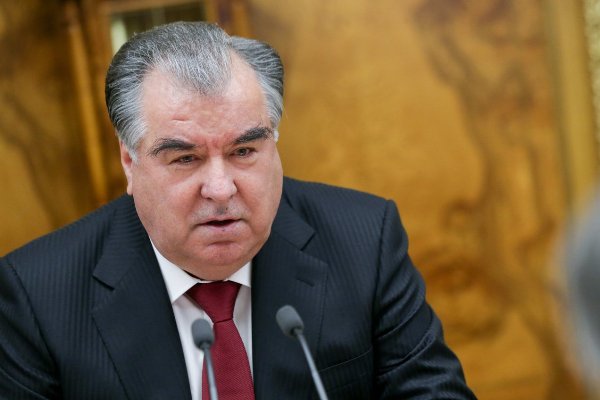
DUSHANBE, 15.06.2021 (NIAT Khovar) – Tajikistan is presiding over the Shanghai Cooperation Organization (SCO). The current and its third presidency coincides with the organization’s 20th anniversary and is held under the motto “Twenty Years of the SCO: Cooperation for Stability and Prosperity.” On this occasion, , the Founder of Peace and National Unity, Leader of the Nation, President of the Republic of Tajikistan Emomali Rahmon discussed SCO matters and goals with Khovar National Information Agency.
Khovar: Mr. President, the anniversary is an occasion to remember the past, evaluate the present and attempt to envisage the future. You stood at the origins of the SCO establishment. How was this regional organization formed?
President: It all began exactly a quarter of a century ago with an active dialogue between the heads of states. In 1996, the Chinese city of Shanghai hosted the first meeting of the heads of five states, namely that of Kazakhstan, Kyrgyzstan, Russia, Tajikistan, and China, during which an Agreement on Confidence-Building in the Military Field Along the Border Areas was signed. Based on this agreement, a regional mechanism of interaction called the Shanghai Five was established. A year later, in 1997 in Moscow we signed the agreement on mutual reduction of armed forces in the border areas.
On July 4-5, 2000, the fifth and last meeting of the heads of state of the Shanghai Five took place in Dushanbe, the final declaration of which contained a provision providing for the transformation of the Shanghai Five into a regional structure with a multilateral cooperation in various fields.
Subsequently, on June 14-15, 2001 in Shanghai, at the summit of the leaders of Kazakhstan, China, Kyrgyzstan, Russia, Tajikistan, and Uzbekistan, an announcement was made of the creation of a multilateral structure called the Shanghai Cooperation Organization. Therefore, it can be said that the Dushanbe meeting of the heads of state of the Shanghai Five laid the conceptual basis for SCO’s creation.
Khovar: In June 2002, the SCO Charter was signed in St. Petersburg. This document is considered a fundamental document. What are the main goals and objectives of the SCO?
President: The SCO Charter is a historical document of decisive importance for the organization. It defines the goals and key areas of cooperation. It lays a solid legal basis for the functioning of the organization. The Charter defines three main areas of activity that ensures our joint progressive development within the framework of the association. It encompasses cooperation in politics, security, economy, culture, and in the humanitarian sphere.
According to the Charter, the main goals and objectives of the SCO are strengthening mutual trust, friendship, good neighborliness, maintaining and strengthening peace, security and stability in the region, jointly countering terrorism, separatism, extremism and all of their manifestations, promoting comprehensive and balanced economic growth, social and cultural development in the region, as well as maintaining and developing relations with other states and international organizations. Today SCO member states are progressively implementing the provisions laid down by its founding fathers.
Khovar: How did the SCO continue to develop? What subsequent events can be deemed significant?
President: First, I would like to note that in 2007 the SCO countries signed a Treaty on Long-Term Good Neighborliness, Friendship and Cooperation. This was very important.
Another important step towards the development of the SCO was the meeting of the Council of the Heads of State in 2005, which granted observer status to two major Asian powers, namely India and Pakistan, which, twelve years later, became full members.
Over time, Mongolia, Belarus, Afghanistan and Iran also receive observer status, while Armenia, Azerbaijan, Turkey, Cambodia, Nepal and Sri Lanka received dialogue partner status. More than ten states, including Ukraine, Saudi Arabia, Qatar, Israel, and others have applied to participate in the SCO under the observer status.
Today, the organization has expanded geographically and increased its importance in the global arena.
Khovar: What opportunities does the organization have and what is its status globally?
President: The territory of the SCO, including that of its observer states, extends from the Atlantic to the Pacific Ocean and from the Arctic to the Indian Ocean, occupying more than 60 percent of the Eurasian continent, and on this territory, which is over 34 million square kilometers, live over 3 billion people, which is almost half of the world’s population.
Twenty years is a short time in terms of human history, but in this short time the SCO was able to acquire international recognition and has become a successful platform for multidisciplinary interaction. Over the years, the legal framework of the organization has been formed and is constantly being improved, and its solid institutional foundations have been created.
Today, the SCO is an influential and responsible participant in the modern system of international relations, contributing to ensuring peace, security, settling international and regional conflicts exclusively by political and diplomatic means, proceeding from the principles of equality, respect for sovereignty, territorial integrity, and non-interference in the internal affairs of states, with the refusal to use or threaten the use of force. In a word, over a relatively short period of time, the organization has become a significant force in regional and global politics.
Khovar: The SCO Development Strategy until 2025, which was adopted following the Ufa summit in July 2015, defines the guidelines and parameters for the evolution of the organization. What is key in this document?
President: The Strategy emphasizes that the SCO countries respect the right to choose the path of political, economic, social, and cultural development, considering the historical experience and national characteristics of each state, promote inter-civilizational dialogue, common peace, progress, and harmony. It also advises that they be guided by the principles of non-interference in internal affairs of states, respect the sovereignty and territorial integrity of the SCO member states, and refrain from supporting the use of unilateral pressures without the approval of the UN Security Council. This is one of the important points of the document.
Additionally, the SCO activities will not be directed against third countries and their associations. The member states proceed from the immutability of the principle enshrined in the SCO Charter of preventing any illegal actions directed against the interests of the SCO. The SCO states also intend to help the international community give equal importance to «all types of human rights, including the right to development.»
According to the strategy, special attention is paid to cooperation on countering the activities of international terrorist organizations aimed at involving citizens of SCO member states in terrorist, separatist, and extremist groups. The SCO countries counteract the spread of extremist and separatist ideas, primarily among young people, and work to prevent religious extremism, aggressive nationalism, as well as ethnic and racial intolerance.
In the sphere of ensuring regional security and stability, in addition to countering terrorism, members states continue to fight against illicit drug and weapons trafficking, illegal crossing of nuclear materials, cross-border crime, illegal migration, and human trafficking.
Khovar: This jubilee year for the SCO is the time to sum up the results of its activities. Were the set tasks of the organization achieved?
President: Undoubtedly, for Tajikistan, as well as for all Central Asian states, with the emergence of the SCO, the conditions for safe and stable development have improved, and a serious impetus has been given to multilateral economic cooperation. This is our common merit, and we can be proud of our joint achievements.
It is noteworthy that the main trade partners of Tajikistan at present are precisely SCO member states, namely Russia, China, Kazakhstan, Uzbekistan, Pakistan, and India.
The SCO Regional Anti-Terrorist Structure (RATS) also makes a real contribution to global and regional security, coordinating the efforts of member states in the fight against the so-called «forces of three evils» and other types of cross-border crimes.
Over the years of SCO’s existence, the established SCO-Afghanistan Contact Group has been aiming to help Afghanistan, our southern neighbor, to become a stable and secure state, free from terrorism and drug-related crime, helping its inhabitants live in peace with its neighbors.
Now, the SCO has expanded to eight member states due to the inclusion of India and Pakistan as full members.
As for the implementation of the set tasks, I can say that assessments of what has or has not succeeded over the past 20 years will be given by the heads of the SCO member states on September 16-17 this year during the Dushanbe summit.
Khovar: Mr. President, as the Chairman of the Council of Heads of SCO Member States, what are the main tasks and areas of work of the organization in 2021 that you can single out?
President: The main task is to strengthen the potential and international position of our organization. I have briefly outlined our vision of the main directions of joint work during Tajikistan’s presidency in the SCO at the previous summit which took place in November last year.
I repeat that against the backdrop of the coronavirus pandemic, we are now facing new socio-economic challenges. The national economies of member states, including Tajikistan, have suffered significant damages. The pandemic has forced certain adjustments to the dynamics of global economic growth. It has become a factor in the sharp rise in unemployment, an obstacle to the inflow of investments and the development of trade. Various countries have and may continue to face food security threats. According to authoritative international organizations, the negative impact, and consequences of the pandemic on the world economy is long-term.
Obviously, these challenges dictate the urgency of an adequate joint response. It is extremely important to build up trade and economic cooperation within the SCO space. Unimpeded transportation of social goods in the SCO space, including food products and medicines is of great importance.
We see the priority of our presidency in further strengthening the internal consolidation of our organization using all available opportunities and resources for mutual support. Accordingly, the focus is on the widespread use of the transit possibilities of the SCO space.
There is a need to increase cooperation in the industrial production and energy sectors, especially in the areas of renewable energy sources, including hydropower. In this context the first meetings of the ministers of industry and energy of the SCO member states are scheduled to be held in Dushanbe in July and August of this year. We hope that these events will lay the foundation for the creation of full-fledged mechanisms of interaction within the SCO in these areas. I think that during the Dushanbe SCO summit we will adopt appropriate decisions.
We look forward to the comprehensive promotion of a set of issues related to food security. In the context of humanitarian cooperation, Tajikistan, as chairman, supports all proposals to expand cooperation in the fields of education, science, culture, sports, tourism, as well as work with youth.
In the current context, the development of cooperation in the field of environmental protection, including climate change, is of particular importance. Tajikistan has 13,000 glaciers and about 1,000 rivers, which form more than 60 percent of Central Asia’s water resources. The availability of these resources creates the basis for the development of a green economy.
The joint use of Tajikistan’s immense hydropower potential will significantly increase the level of energy supply to the countries of the region, reduce the cost of its production, reduce the damage to the environment, including by limiting the volume of carbon dioxide emissions into the atmosphere. Therefore, we look forward to the continued support of partners in the implementation of our initiatives on the global water agenda, including the proposal to establish an International Glaciers Protection Fund.
Of course, I consider it necessary to promote the joint purposeful work to combat global threats and security challenges. The issues of cybercrime and countering the spread of various radical ideologies, especially among young people, require special attention.
All these areas cover the Concept of Tajikistan’s presidency in the SCO in 2020-2021, as well as the Plan of Key Events. Most of the activities included in this plan will take place in Tajikistan and will include meetings of ministers of foreign affairs, defense, justice, finance, health care, transport, secretaries of security councils, heads of anti-drug bodies, tourism departments, as well as a gala concert, festivals, and forums with the participation of representatives of the SCO family.
Khovar: By the way, the Plan of the main events of Tajikistan’s presidency in the SCO also includes the Forum of SCO Mass Media Heads scheduled in early August this year. What is the role of the media in the development of cooperation between the organization’s member states?
President: They are very important, given that we live in a period of rapid development of information and communication technologies. I have stated more than once that this is the century of global informatization. As you know, back in 2003, we had adopted the State Strategy Information and Communication Technologies for the Development of Tajikistan.
Today information is becoming one of the most important tools for shaping the future of humanity. How the world will live tomorrow and how it will remember the past largely depends on how the media covers today’s events. The position of journalists, bloggers, writers, and other creative people determine the atmosphere both within a particular country and between states.
Khovar: How do you assess the potential and prospects of the SCO?
President: I want to repeat one simple truth that no goal is impossible if there is the desire to accomplish it. And the SCO leaders are full of desire to change life in the region for the better.
The main content of the principles of the organization’s activities are openness, trust, equality, good-neighborliness, mutual benefit, mutual consultations, respect for the diversity of cultures and civilizations, and the desire for joint creation and development. These principles are rightfully considered pivotal in the formation of cooperation between member states as a new model of regional interaction with the goal of achieving universal harmony and prosperity.
I would like to note that the ideas of friendship, goodwill, mutual trust, good-neighborliness, and mutual support permeate the works of a whole galaxy of great personalities and thinkers of the East, — the glorious ancestors of the peoples now inhabiting the SCO space. Passing from generation to generation, from era to era, this heritage is a collection of enduring values that remain relevant outside time and space. We need to protect, multiply and apply them in everyday life and activities.
In this regard, I am confident that the decisions that will be made during the anniversary summit of the organization in Dushanbe will serve to further strengthen regional security and stability, build up cooperation within its framework in political, economic, humanitarian, and other areas of mutual interests.
Khovar: Thank you, Mr. President, for your time! We wish you good health, good luck in all your endeavors, including the successful holding of Tajikistan’s presidency over the Shanghai Cooperation Organization!
PHOTO by the Press Service of the President of the Republic of Tajikistan / Khovar











 Lonely Planet Includes Tajikistan among the World’s Best Travel Experiences
Lonely Planet Includes Tajikistan among the World’s Best Travel Experiences SCO Scholars Highlight Connectivity and Cooperation at Media and Think Tank Summit in China
SCO Scholars Highlight Connectivity and Cooperation at Media and Think Tank Summit in China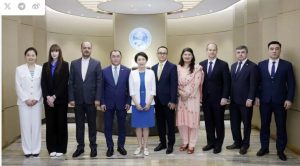 Consultations on Information Cooperation Held Among SCO Member States’ Foreign Ministries
Consultations on Information Cooperation Held Among SCO Member States’ Foreign Ministries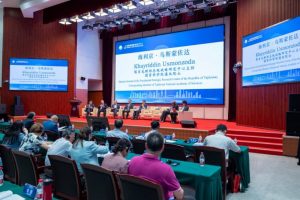 Think Tank Forum Held in Shanghai Ahead of the SCO Heads of State Summit
Think Tank Forum Held in Shanghai Ahead of the SCO Heads of State Summit SCO Energy Ministers Meeting to Be Held in Ningbo
SCO Energy Ministers Meeting to Be Held in Ningbo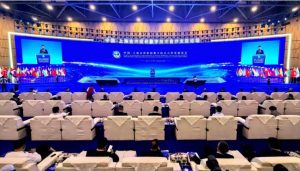 China-SCO Forum on Digital Development and Cooperation Held in Karamay
China-SCO Forum on Digital Development and Cooperation Held in Karamay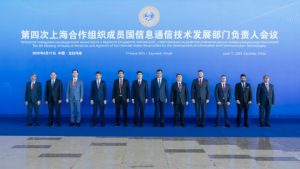 SCO Ministerial Meeting on Information and Communication Technologies Held in China
SCO Ministerial Meeting on Information and Communication Technologies Held in China Emomali Rahmon and Xi Jinping Highlight Significance of Launching Direct Passenger Flights between Dushanbe and Beijing
Emomali Rahmon and Xi Jinping Highlight Significance of Launching Direct Passenger Flights between Dushanbe and Beijing American Environmentalist Caroline Gleich Praises Tajikistan’s Leadership in Glaciers’ Protection
American Environmentalist Caroline Gleich Praises Tajikistan’s Leadership in Glaciers’ Protection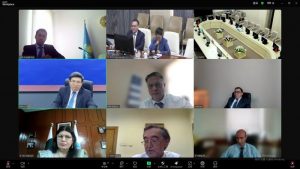 Meeting of SCO Council of National Coordinators Held Online
Meeting of SCO Council of National Coordinators Held Online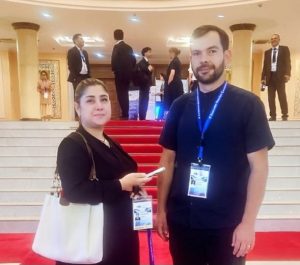 Tajikistan Provides Key Platform for Science–Policy Dialogue on Glacier Preservation, Says UCA Researcher
Tajikistan Provides Key Platform for Science–Policy Dialogue on Glacier Preservation, Says UCA Researcher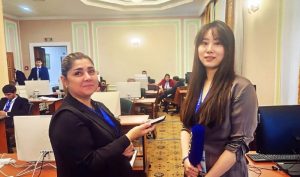 CGTN Journalist Praises Tajikistan’s Leadership on Glaciers’ Issues and Highlights China-Tajikistan Cooperation
CGTN Journalist Praises Tajikistan’s Leadership on Glaciers’ Issues and Highlights China-Tajikistan Cooperation














